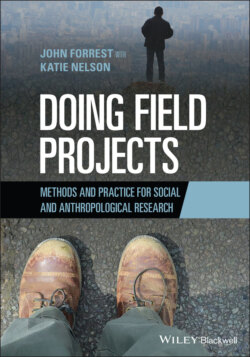Читать книгу Doing Field Projects - John Forrest - Страница 30
Openness
ОглавлениеI usually had at least one student each year in my methods class who wanted to hide recording equipment from participant-observer events to capture the “real thing,” or take photos without permission. Such practices are always unethical. There is a bit of a grey area here when it comes to public events, but the guidelines are straightforward. I err on the side of caution. That is, I never take a person’s photograph without their approval (whether I am going to disseminate it or not). In this case, you are not looking for formal informed consent, you are just asking something like, “Is it all right to take your photo.” You may be surprised at the percentage of people who refuse – for whatever reason. After all, it is intrusive to take a stranger’s photograph.
In public settings it can be acceptable to take group photos, especially if other participants are doing the same. But publishing such photos may still land you in ethical trouble. Publishers may refuse to use a photo if the people in it are identifiable (and you do not have informed consent from them). I ran into this problem when picking cover photos for one of my books. The photo was of a baptism by full immersion in a local body of water which I thought was remarkably engaging, but my publisher would not allow it. Even though the event was in the open and fully accessible to the public at large, it was not ethical to publish the photo.
When you are dealing with events that are open to the public, you must be careful. Take, for example, a Sunday church service or Friday prayers at the local Mosque. You are likely freely invited to attend, but your motives for attending may not be clear to all in attendance. In general, it is not ethical to make recordings at such events, and photography is likely forbidden. You can speak to the imam or pastor before the service, and/or you can speak to participants to discover what is and is not permissible. You can also simply look around. Are other participants taking notes or photos? If not, you should not either. Apart from being good ethical practice, this injunction is also good fieldwork practice in general: you do not want to draw attention to yourself unnecessarily.
Events that have their own internal ethical guidelines prohibiting reportage must be strictly avoided. These include the likes of 12-step meetings, Masonic rituals, fraternity initiations, and so forth. They are quite intentionally secret affairs, so that even if you are eligible to attend them, you may not report on them. No exceptions.
